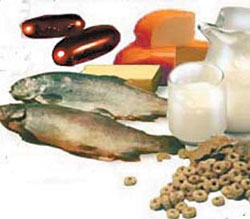IN BRIEF (Page 19)
Hopes for new cancer vaccine
Human Papillomavirus (HPV) Quadrivalent Recombinant Vaccine prevented 91 percent of persistent infections, low-grade cervical abnormalities, pre-cancers, and external genital lesions in women aged 24 through 45, according to new data presented at the 24th International Papillomavirus Conference held in Beijing last week.
The data shows the potential benefits that the vaccine, which is currently used to prevent cervical cancer in girls and women aged 9 to 26, may have for women up to 45 years old.
"Women remain at significant risk of HPV infections and developing HPV-related diseases throughout their lifetime," says Eliav Barr, head of the HPV Vaccine Program, Merck Research Laboratories.
In the Asia-Pacific region, cervical cancer ranks second only to breast cancer as the most common among women. In 2002, about 53,000 women died from the disease in Southeastern and Eastern Asia. Worldwide, approximately 630 million people (one in 10) are infected with HPV.
The vaccine produced by Merck, one of only two types available for cervical cancer prevention, has been approved in 85 countries. In China, it will now be subject to State Food and Drug Administration (SFDA) approval.
Protect those baby teeth
Cavity prevention needs to start right away with babies.
Simple steps like running pacifiers and bottle nipples under running water are important first steps toward dental care, advises the Hamburg-based health insurer DAK.
Parents should never suck on the nipple, since they might transfer bacteria to their child. Children should be weaned from bottles with nipples after their first birthday to help avoid a problem known as baby bottle tooth decay.
For similar reasons, babies should only get their bottles when they are actually thirsty. Sweetened teas and juices should be avoided. Water and unsweetened tea are recommended.
Anti-aging: D is the key

Healthy levels of vitamin D may help to slow the aging process and protect against age-related diseases, a team of British scientists has found. The claim follows a study of more than 2,000 women which found that those with the lowest vitamin D levels showed the greatest signs of biological aging.
The team, led by Brent Richards, an endocrinologist, recorded vitamin D levels in 2,160 women aged 18-79. The scientists then took white blood cells and examined them for genetic signs of ageing.
Among the most reliable measures of a person's age are telomeres, the lengths of genetic material that cap the free ends of DNA in a cell. With age, the telomeres shorten and the DNA becomes more unstable until eventually the cell dies. For the experiment the women were organized into three groups according to their vitamin D levels. The study found that those with the highest vitamin levels had significantly longer telomeres - equivalent to five years of normal aging - than those showing the lowest vitamin D scores.
Foods, such as milk, fish, eggs, liver and cereal, are rich in vitamin D.
Moms-to-be often anxious
It is not uncommon for expectant mothers to feel anxious and depressed, new research shows, and these feelings can have serious consequences for mom and baby. "Mental health problems in the postpartum period have received much attention in the past decade," Dr Antoinette Lee of the University of Hong Kong says, whereas mental health problems in the period before birth, known as the antenatal period, have received considerably less attention.
When small strokes turn big
Mini-strokes lead to a major stroke within a week in one out of 20 people and should be treated as a medical emergency, British doctors said on Sunday. They said people who were immediately treated for the small strokes, called transient ischemic attacks, or TIAs, had almost no risk of a major stroke soon afterward.
China Daily-Agencies
(China Daily 11/14/2007 page19)














